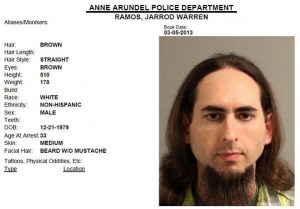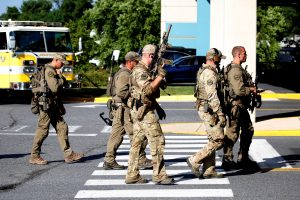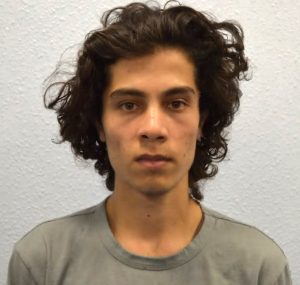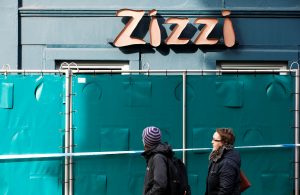
By Warren Strobel
ANNAPOLIS, Md. (Reuters) – A man who had a long-running feud with an Annapolis newspaper blasted his way through its newsroom with a shotgun on Thursday, killing at least five people in one of the deadliest attacks recorded on a U.S. media outlet, authorities said.
The suspect fired through a glass door, looked for victims and then sprayed the newsroom of the Capital Gazette newspaper group in Annapolis with gunfire, police and a witness said.
Acting police chief of the Anne Arundel County Police Department William Krampf told a news conference that Capital Gazette assistant editor Rob Hiaasen, 59, was among the victims.
Wendi Winters, 65, Rebecca Smith, 34, Gerald Fischman, 61, and John McNamara were also killed, he said. Smith was a sales assistant and the others were journalists.
“This was a targeted attack on the Capital Gazette,” Krampf said. “This person was prepared to shoot people. His intent was to cause harm.”
The suspect is Jarrod Ramos, 38, of Laurel, the Capital Gazette and Baltimore Sun reported, citing law enforcement.
Anne Arundel County police said on Twitter that due to investigative reasons, they have not released the name of the suspect in custody, adding that as of Thursday evening, the suspect has not been booked.

Jarrod Ramos, suspected of killing five people at the offices of the Capital Gazette newspaper office in Annapolis, Maryland, U.S., June 28, 2018 is seen in this 2013 Anne Arundel Police Department booking photo obtained from social media. Social media via REUTERS
In 2012, Ramos brought a defamation lawsuit against Eric Hartley, formerly a staff writer and columnist with publication The Capital, and Thomas Marquardt, then editor and publisher of The Capital, according to a court filing.
In 2015, Maryland’s second-highest court upheld a ruling in favor of the Capital Gazette and a former reporter who were accused by Ramos of defamation.
According to a legal document, the article contended that Ramos had harassed a woman on Facebook and that he had pleaded guilty to criminal harassment. The court agreed that the contents of the article were accurate and based on public records, the document showed.
Ramos said on Twitter that he had set up an account to defend himself, and wrote in his bio that he was suing people in Anne Arundel County and “making corpses of corrupt careers and corporate entities.”
‘A WAR ZONE’
Phil Davis, a Capital Gazette crime reporter, said he was hiding under his desk along with other newspaper employees when the shooter stopped firing, the Capital Gazette reported on its website.
The newsroom looked “like a war zone,” he told the Baltimore Sun, adding, “I don’t know why he stopped.”
“As much as I’m going to try to articulate how traumatizing it is to be hiding under your desk, you don’t know until you’re there and you feel helpless,” Davis said.
Police officers in the Maryland capital of Annapolis responded within a minute to a 911 call about a shooting in progress and apprehended the suspect who was hiding under a desk, authorities said.
Police are treating the shooting as a local incident, with no links to terrorism, a law enforcement source told Reuters. Krampf did not say why the gunman may have targeted the newspaper or its employees.

Special tactical police gather after a gunman opened fire at the Capital Gazette newspaper, killing at least five people and injuring several others in Annapolis, Maryland, U.S., June 28, 2018. REUTERS/Joshua Roberts
When police found the suspect, his weapon was on the ground and “not in his immediate proximity,” Steve Schuh, Anne Arundel county executive, told cable news station CNN.
Police said they recovered what they thought might have been an explosive device but Krampf later said the suspect had smoke grenades. Investigators were in the process of securing his Maryland residence and obtaining search warrants, he said.
The suspect appeared to have damaged his fingertips to try to avoid detection and was refusing to cooperate with law enforcement, Baltimore TV station WJZ and other local media reported. Krampf did not comment on those reports.
Capital Gazette runs multiple newspapers out of its Annapolis office and the group includes one of the oldest newspapers in the United States, The Gazette, which traces its origins back to 1727.
The company, part of the Tronc Inc <TRNC.O> media group, publishes newspapers in and around Annapolis, home of the U.S. Naval Academy. The papers have thrived by focusing on local news in the shadows of two much larger competitors, the Washington Post and Baltimore Sun.
‘WE’RE PUTTING OUT A PAPER’
Law enforcement in Baltimore and New York City deployed extra officers to the offices of the New York Times and other major media outlets as a precaution, authorities said.
The shooting drew the attention of media groups, including Reporters Without Borders, which said it was deeply disturbed by the events in Annapolis.
White House spokeswoman Lindsay Walters said that U.S. President Donald Trump had been briefed on the shooting.
“My thoughts and prayers are with the victims and their families. Thank you to all of the First Responders who are currently on the scene,” Trump said in a tweet.
White House Press Secretary Sarah Sanders said on Twitter, “A violent attack on innocent journalists doing their job is an attack on every American.”
Jimmy DeButts, an editor at the Capital Gazette, tweeted that he was devastated, heartbroken and numb.
“I’m in no position to speak, just know @capgaznews reporters & editors give all they have every day. There are no 40 hour weeks, no big paydays – just a passion for telling stories from our community,” he wrote.
One of the group’s flagship papers, The Capital, plans to publish a Friday edition, several reporters with the group said. “I can tell you this: We are putting out a damn paper tomorrow,” reporter Chase Cook wrote on Twitter a few hours after the shooting.
(Reporting by Warren Strobel; additional reporting by Mark Hosenball and Jeff Mason in Washington, Colleen Jenkins in North Carolina, Diana Kruzman, Tea Kvetenadze, Frank McGurty and Peter Szekely in New York, Bernie Woodall in Fort Lauderdale, Florida and Andrew Hay in New Mexico; Writing by Jon Herskovitz; Editing by Richard Chang, Grant McCool, Toni Reinhold)











